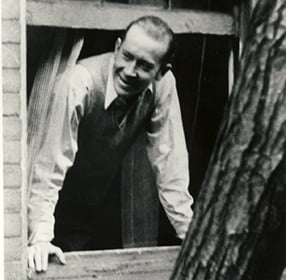Here’s a Little Mouse
here’s a little mouse) and
what does he think about, i
wonder as over this
floor (quietly with
bright eyes) drifts (nobody
can tell because
Nobody knows, or why
jerks Here &, here,
gr(oo)ving the room’s Silence) this like
a littlest
poem a
(with wee ears and see?
tail frisks)
(gonE)
“mouse,”
We are not the same and
i, since here’s a little he
or is
it It
? (or was something we saw in the mirror)?
therefore we’ll kiss; for maybe
what was Disappeared
into ourselves
who (look). ,startled
This poem is in the public domain. Published in Poem-a-Day on August 3, 2024, by the Academy of American Poets.
“Here’s a Little Mouse” by E. E. Cummings appears in the anthology Poetry of Our Times (Scott, Foresman and Company, 1928), selected and edited by Sharon Brown of Brown University. In 2017, Journal of Literary Semantics published “‘nearerandnearerandNEARER’: Foregrounding effects of the unconventional capitalization in the experimental poetry of E. E. Cummings” by Eva María Gómez-Jiménez, professor of English language and applied linguistics at the University of Birmingham. In her study evaluating Cummings’s poetry, Gómez-Jiménez “suggests the possibility that unconventional patterns in the use of capitals in the experimental poetry of E. E. Cummings produce meaningful effects.” She classified different types of capitals Cummings used to affirm “capitals foregrounding mostly (1) emphasizes certain elements in the poems, but may also (2) indicate plays on words, (3) embody iconic effects and (4) convey chaotic scenes. Further less frequent functions identified [in this study] include (5) the schematization of different units within a poem, (6) the reproduction of changes in the tone of some poetic voices and (7) the reproduction of realia.”

